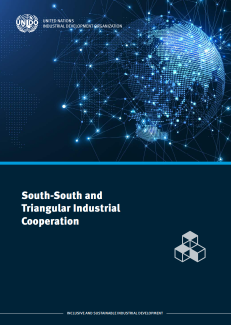UNIDO publication on South-South and triangular industrial cooperation
UNIDO’s recent publication on the South-South and triangular industrial cooperation (SSTIC) featured good practices from the UNIDO technical cooperation project portfolio providing a selection of SSTIC activities for the industrial upgrading and modernization of agro-chemical and agro-machinery sectors in Cuba; competitiveness improvement of textile, embroidery and carpet-weaving sectors in Tajikistan; linking the tourism industry to productive activities in the Kyrgyz Republic and improving market access of traditional food products in Morocco and Tunisia.
This publication provides insights in UNIDO’s work in promoting best practices for inclusive and sustainable industrial development by facilitating partnerships, technology transfers, and the exchange of knowledge among countries of the Global South.
Based on multi-stakeholder partnerships fostered through UNIDO technical cooperation projects, transfer of expertise, know-how, best practices was ensured resulting in the creation of higher value added products and services with considerable competitiveness potential in terms of conquering new export markets. Projects in Cuba, Tajikistan, Kyrgyz Republic, Morocco and Tunisia largely stimulated product diversification of local manufacturers, contributing to better integration in regional and global markets. To ensure the projects’ long-term sustainability, these interventions aimed to support the retention of new acquired knowledge underpinning emerging pools of national expertise, which are expected to enable local counterparts and beneficiaries to build upon and replicate these experiences in other industries adapting them to specific development needs and objectives.
Placing particular focus on fostering cooperation between governmental, non-governmental and vocational training institutions, as well as private sector enterprises, all projects demonstrated significant impact on increased job creation and development of sector-specific skills, while advancing gender equality by contributing to improved access of women to labour- and specialized knowledge-intensive manufacturing jobs.
Read the publication here.
For further information contact Fabio Russo (F.Russo [at] unido.org (F[dot]Russo[at]unido[dot]org)); Farrukh Alimdjanov (F.Alimdjanov [at] unido.org (F[dot]Alimdjanov[at]unido[dot]org)); Anatoly Balovnev (A.Balovnev [at] unido.org (A[dot]Balovnev[at]unido[dot]org)).

